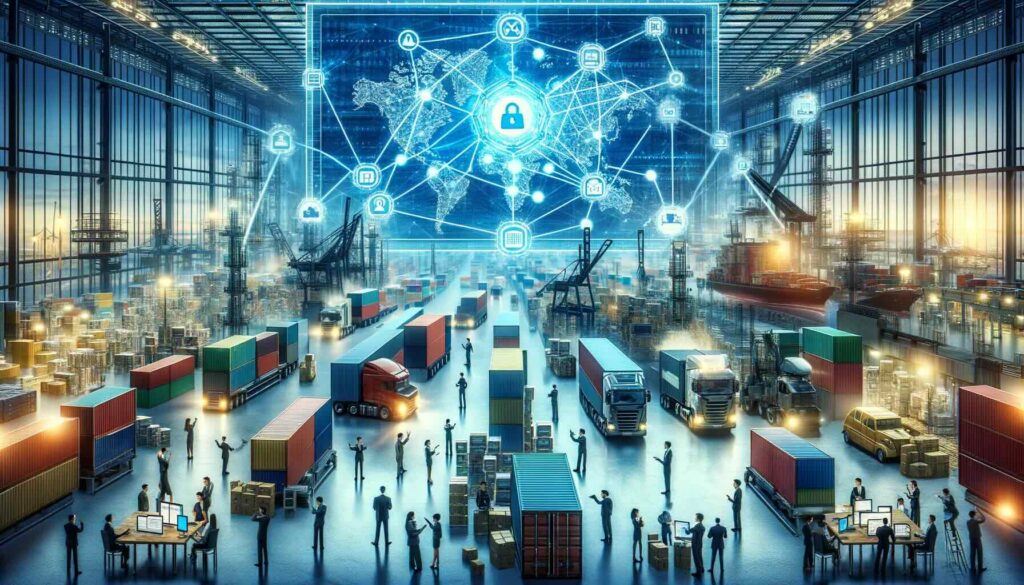Blockchain technology has the potential to revolutionize many industries, including government services and operations. A blockchain is a distributed ledger that is transparent, secure, and decentralized. This emerging technology can provide governments with new tools to deliver services more efficiently and securely.
In this article, we will examine how blockchain can transform the public sector and the way societies are governed. We will look at key areas where blockchain can be applied in government like identity management, voting, taxes, benefits delivery, and record keeping. We will also consider the challenges and limitations of implementing blockchain technology in the public sector.
How Blockchain Works
Before diving into the government applications, let’s review the basics of how blockchain technology functions.
A blockchain is a digital ledger or database that is shared across a network of computers. When a new transaction occurs, it is recorded on the blockchain in a block. This block is connected to the previous block, creating a chain of blocks that contain transactions.
Some key attributes of blockchain technology:
- Decentralized – The ledger is distributed across many computers in a peer-to-peer network rather than controlled by a central authority. This avoids a single point of failure.
- Transparent – Participants in the network can view and verify transactions on the public ledger. This provides transparency and trust.
- Secure – Transactions are cryptographically signed and chained together. It is very difficult to tamper with records on the blockchain.
- Immutable – Once data is recorded on the blockchain, it is extremely difficult to alter it. The record provides an indelible timestamped transaction history.
These features allow blockchain to facilitate trusted information sharing and transactions without third-party intermediaries. The technology has the potential to reduce costs, corruption, and friction in government administrative services. Next, let’s look at some specific use cases.
Identity Management
One of the most promising uses of blockchain for government is digital identity management. Identity fraud costs governments massive amounts of tax revenue. Blockchain can secure citizen digital identities in a decentralized way.
A blockchain-based identity system would allow citizens to own and control their personal identification data. The blockchain would act as the citizen’s permanent identity ledger, recording identifying information like name, date of birth, address, and other attributes.
The citizen would be issued a private key to access their identity records on the blockchain. This key could be stored on a smartphone or physical device. Citizens could choose what identification data to share with government departments and third parties, avoiding the need to repeatedly provide the same documentation.
For example, when applying for government benefits, the citizen could cryptographically sign their application with their private key to validate their identity to the government department. This can prevent fraudulent claims.
Estonia has demonstrated one of the most advanced blockchain identity systems globally through its eResidency program. Citizens can use their digital ID to access over 3000 government services, including voting, banking, and healthcare. Blockchain identity systems can significantly improve privacy, security, and efficiency for citizens interacting with government.
Voting
Election security is another promising use case for blockchain in government. In many countries, paper ballot systems continue to be vulnerable to tampering and fraud. Blockchain-based voting could provide a transparent and tamper-proof digital alternative.
There are a few potential models of blockchain voting:
- Recording votes directly on blockchain – Citizens can cast ballot votes on the blockchain, logged immutably against their verified identity.
- Blockchain-backed paper voting – Paper votes are cast normally at polling stations but also recorded on a blockchain to enable easier auditing and prevent tampering with results.
- Blockchain voter registration and ID verification – Citizens can register to vote via a blockchain identity management system which prevents fraudulent registrations. Their digital identity can also be validated when voting.
Blockchain also enables innovative voting models such as mobile voting and perpetual voting on issues. Although some risks around privacy and security need to be resolved, blockchain voting offers a promising future for fraud-resistant digital democracy.
Taxes
Tax administration is notoriously complex and inefficient in many countries. However, blockchain systems can simplify tax processes and make tax collection more transparent and accurate.
Some examples of blockchain tax applications:
- Automated tax filing – Blockchain smart contracts can be programmed to automatically process and file simple tax returns for citizens based on income data. This removes paperwork and speeds up processing.
- Invoice tracking – Sales invoices between businesses can be recorded on a blockchain ledger to provide auditable records for tax agencies to accurately identify tax liabilities.
- Tax payment – Blockchain transaction records provide traceability. Tax payments can be made transparently using cryptocurrencies and smart contracts programmed to transfer funds to government accounts.
By streamlining compliance and preventing fraud, blockchain tax administration can increase revenues collected while lowering operating costs for revenue agencies. Citizens also benefit from faster processing and peace of mind that their taxes are being managed securely.
Benefits Delivery
Government welfare and social security programs distribute billions in cash transfers and benefits each year. These schemes are frequently plagued by inefficiency and fraud. Recipients often struggle to get access to benefits.
Direct benefit transfers recorded on blockchains can enhance transparency, efficiency, and security of government aid programs. Benefits can be issued in the form of blockchain-based stablecoins or cryptocurrencies that recipients securely store in digital wallets. Smart contracts can automate benefit payments when recipients meet verification conditions (e.g. income level, age, location) encoded in the contract logic.
Recipient identities and qualification criteria can be stored in blockchain records and audited by authorities. This prevents repeat applications from the same person under different identities, saving billions lost to benefit fraud. Eligible recipients who were previously unbanked gain access to blockchain-based financial services. Even conditional welfare programs can be embedded in smart contracts. Overall, blockchain improves access and reduces leakage in social protection schemes.
Government Record Keeping
Maintaining records is a core function of government agencies. This includes registrations (births, marriages, licenses), judicial records, regulatory compliance records, and more. Record keeping processes are typically manual which leads to slow processing, human error in data handling, and physical storage limitations.
If government records are migrated to blockchain platforms, the benefits are:
- Distributed record storage makes records securely accessible from anywhere while avoiding centralized data breaches.
- Timestamping records on blockchain establishes proof of event, content, and time that cannot be altered.
- Digital signatures, access permissions and data encryption maintain privacy while enabling controlled information sharing between government bodies.
- Records integrity is maintained even if original storage devices fail or get destroyed.
- Transitioning to paperless government records via blockchain saves storage and processing costs while enabling real-time updates.
Just as blockchain powers Bitcoin’s ledger of transactions, it can become the backbone for trusted information exchange across government entities.
Challenges in Public Sector Blockchain Adoption
Despite its promise, there are significant barriers to large-scale adoption of blockchain across government:
- Technological maturity – Blockchain is still an emerging technology and standards are lacking, especially for complex identity and voting systems. Continued research and development is needed.
- Regulatory uncertainty – Government policymakers are still playing catch-up in creating blockchain regulations. Unclear legal frameworks create risk and slowness in deploying blockchain systems.
- Privacy concerns – Public sector blockchain initiatives can impinge on personal privacy rights if improperly implemented with excessive transparency. Further technical and legal protections are required.
- Cost – While blockchains can generate long-term efficiencies, initial investment needed in infrastructure, training and migration to blockchain systems may be prohibitive for cash-strapped governments.
- Incumbent resistance – Transitioning from legacy processes and job roles to blockchain-based systems will inevitably face institutional resistance. Stakeholders will need clear incentives to adopt change.
Despite these real barriers, government blockchain adoption is accelerating globally. The technology will profoundly impact how citizens relate with governments as service providers.
The Future: From E-government to Blockchain Governance?
Blockchain has moved beyond hype into early deployment for limited government applications. But what is the future potential as the technology matures? Here are some possibilities:
Automated bureaucracy
With advanced smart contracts and IoT integration, blockchain could enable a radical vision of automated bureaucracy. Smart contracts could receive and process citizen applications for services, instantly issue documentation, and transfer approved benefits. This could massively shrink slow and redundant bureaucratic processes and lower administrative costs.
Government accountability
Blockchain transaction transparency provides a powerful tool for government accountability. Public spending, procurement contracts, budgets, foreign aid – these could be tracked on public sector blockchains to expose leakages while empowering oversight. Fraudulent and corrupt practices become more difficult.
Decentralized governance
Blockchain enables decentralized models of resource management and governance without centralized authorities. Instead governance rules are encoded into blockchain protocols. This has revolutionary implications for managing public resources and community governance at local levels.
Resilient digital infrastructure
Blockchains offer resilient foundations for critical government digital infrastructure and public cloud services. Shutting down or censoring public blockchains is very difficult compared to traditional centralized servers. This builds trust and protects access.
Digital democracy
Beyond voting, blockchains may enable radically participatory models of policymaking and democracy. Citizens could directly participate in debating and finalizing legislation via blockchain-based platforms, using identifiers that prevent spoofing. This could overcome limitations of representative democracy.
While these scenarios seem futuristic, blockchain is fundamentally changing assumptions of governance and redefining citizen-government relations for the digital age. As the technology landscape shifts, the future of government is irrevocably moving beyond just e-government to embrace decentralized blockchain governance.
Conclusion
Blockchain is on the cusp of transforming core government functions from identity and payments to record keeping and voting. By improving transparency, efficiency, and security, blockchain can rebuild declining public trust in government institutions.
However, realizing this blockchain-powered government will require overcoming adoption challenges around cost, privacy, regulation, and resistance to change. A phased approach is needed, starting with lower risk applications.
As governments harness blockchain, it will alter citizens’ experience and expectations of governance. Direct accountability, fraud-free services, automated bureaucracy, and participatory democracy could become realities. The technology has immense potential to rewire the machinery of governance into a system truly of the people, by the people, for the people.
Frequently Asked Questions (FAQs)
Here are 5 frequently asked questions about the future of government and blockchain technology:
How can blockchain improve identity management by governments?
Blockchain can create decentralized digital identity systems where citizens control their personal data. It allows secure and selective sharing of ID information to access government services without repeated documentation. Blockchain IDs can prevent fraud and increase privacy.
What are the benefits of using blockchain for voting?
Blockchain voting enhances election transparency and security by creating an immutable record of votes. It also enables new models like mobile voting. Blockchain ID verification and voter registration prevents voter impersonation fraud.
How can blockchain technology increase tax compliance?
Blockchains improve invoice tracking, automated tax filing, and payment tracking for tax authorities. This increases collections, compliance and efficiency while reducing tax fraud through enhanced transparency and traceability of transactions.
How does blockchain improve delivery of government benefits?
Smart contracts can automate and track government benefit payments using blockchain stablecoins. This reduces leakage and delays while improving access for recipients. Eligibility verification and identity prevents repeat fraud.
What are some challenges slowing blockchain adoption by governments?
Key adoption challenges include technological maturity, high costs, regulatory uncertainty, privacy concerns, and resistance to change from incumbent systems. Phased implementation and privacy protections are important to overcome these.



